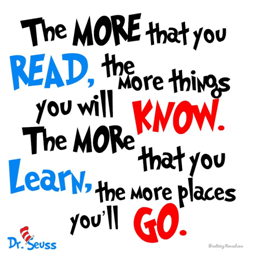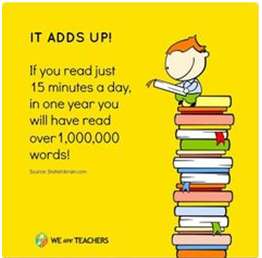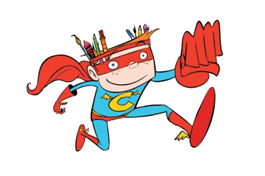Reading Passports
Key Stage 2 are challenged to read 10 books from a range of genres, with a range of themes. As they read a book, they collect one of 10 stamps.
Key Stage 2 are challenged to read 10 books from a range of genres, with a range of themes. As they read a book, they collect one of 10 stamps.
The most important thing you can do for your child’s education is to enjoy reading with your child. Reading Raffle.
Each week, children have the opportunity to win a £5 book voucher. For each day they read at home, with an entry recorded in their reading diary, they get a raffle ticket. The more you read the more chance of winning.

At school we have been focussing on developing reading comprehension skills and a love of reading. The children now all know and use our High Five Question Characters. Ask your child if they can explain what the characters do?
Click on the characters to find out about the type of questions you can ask to develop your child’s comprehension skills.


My first tip is to keep helping your child learn to read quite separate from reading for pleasure. Eventually the two will become one of their own accord as your child becomes a more confident reader and the great thing about this is that the vast majority of children can learn a lot about reading without even realising that that is what is happening.
This is how it’s done, and it’s so utterly simple and pleasurable you may well find yourself looking forward to it. All you have to do is;
 The more you can read to your child, the better, but the evening bedtime story is often the most appropriate, easiest and most enjoyable moment. Ten minutes is enough with a young child but if you can manage fifteen that would be even better. This is the time to settle on the bed with the child, cuddle up and enjoy whatever book has been chosen. The downside to this, if it is a downside, is that your child will soon pick up favourite books and demand that they are read over and over and over again until you are utterly bored – but your child will love it. Every time you read your child will be hearing new words in the context of a story that makes their meaning clear. They will see the print on the page. I am well aware that you and your partner may have been working all day but is ten to fifteen minutes really too much to ask? You will be giving your child an essential life-long skill – and pleasure. Make reading engaging by using accents and silly voices and ending on a cliff hanger.
The more you can read to your child, the better, but the evening bedtime story is often the most appropriate, easiest and most enjoyable moment. Ten minutes is enough with a young child but if you can manage fifteen that would be even better. This is the time to settle on the bed with the child, cuddle up and enjoy whatever book has been chosen. The downside to this, if it is a downside, is that your child will soon pick up favourite books and demand that they are read over and over and over again until you are utterly bored – but your child will love it. Every time you read your child will be hearing new words in the context of a story that makes their meaning clear. They will see the print on the page. I am well aware that you and your partner may have been working all day but is ten to fifteen minutes really too much to ask? You will be giving your child an essential life-long skill – and pleasure. Make reading engaging by using accents and silly voices and ending on a cliff hanger.
Bedtime reading is a time for complete relaxation and preparation for sleep. Imagine for a moment that you are a child still struggling with reading. Your parent is reading a lovely story to you and all of a sudden hands the book over and says: ‘Now you read the next page’. Excuse me? Is that a bedtime story? No, it’s bedtime torture. Not only does it instantly put the child under pressure, it also destroys the comfy atmosphere you have built up and worst of all it encourages the child to associate pressure and failure with reading books. So many children are put off reading in this way.
 Bedtime reading. Let your child choose the book and don’t worry about reading the same one again and again. You can always make an agreement that you should take it in turns to choose a book. If a new book is being introduced and it is quite apparent that the child is not really responding to it, put it aside for another time. It may be too old for them. For example Treasure Island is a great, classic story but hard going for most children under seven, not to mention some older ones too.
Bedtime reading. Let your child choose the book and don’t worry about reading the same one again and again. You can always make an agreement that you should take it in turns to choose a book. If a new book is being introduced and it is quite apparent that the child is not really responding to it, put it aside for another time. It may be too old for them. For example Treasure Island is a great, classic story but hard going for most children under seven, not to mention some older ones too.
Don’t worry if your child keeps choosing what you think are very simple books. You are building up their confidence all the time. Children feel safe with much loved books. Reading for pleasure is NOT about pushing your child on to the next reading rung at school. It’s about what it says on the tin – that word ‘pleasure’.
Staff in good bookshops are usually pretty helpful. You can ask them for advice. If you already have some idea about what kind of stories your child likes then that helps.
Ask your childs teacher
When I go into a school to speak about reading and writing there is often a book sale at the end of the day. On several occasions I have seen a child eagerly pick up a book that excites them only for the parent to say: ‘Put it back, it’s too hard/easy for you’. It makes me want to yell and shout! I don’t of course. Sometimes, if the parent has told the child it’s too hard I say: ‘It would be great for bedtime reading. You can read it to your child. It’s not difficult for them to understand.’ And then again, if the parents says it’s too easy I sometimes ask the parents if they ever read easy books or magazines. Do they always try to choose something that they think will be good for them or stretch them in some way? What do they read on the beach? There are only a few times when a parent should prevent a book being read: when it is obviously way too old for them or when the content is inappropriate. (Quite often these two go hand in hand.)
No book is too silly or too young. Lots of pictures? No problem. Our country publishes the best children’s books in the world and our picture books are wonderful. If you find your child engrossed in one don’t take it away because you think it’s too young. Talk to them about why they like it so much. Feed their enthusiasm, don’t stamp on it! Sometimes it’s good to discuss the book with your child. Talk about the pictures and what’s happening? What’s your favourite part? Why do you think so-and-so felt like that/did that/said that? Just don’t let things get too heavy!
I can’t say this often enough. Reading for pleasure should be exactly that. Show how much you enjoy books. Make sure your child sees you and your partner if you have one, reading. Dads have a particularly important role to play here with boys. If you want your boy to enjoy reading, enjoy it yourself. What do you do to get your boy interested in your favourite football team? Maybe you take him to matches. So you want your boy to read. Read to him. It’s the same principle.
The point is very simple. I hope you can see that reading with your child can be such a lovely, easy and positive experience, especially at bedtime. Your child will feel safe with reading and gradually the educational side of reading will fade away as your child becomes a strong, competent reader. Finally, you can be proud of what you’ve done. You have given your child a wonderful foundation to build on and a love of books that will last for the rest of their lives; a love that will open doors, broaden their horizons, help them make friends and inform every minute of their lives from there on.
Most of the above advice also applies to dyslexic children. After all, you are reading to your child. However, there are books available specifically for dyslexic children, written by excellent authors who produce stories that are not the least bit patronising. Barrington Stoke are a publisher that specialise in this and have been hugely successful. They have a good website.

Our children love telling you what they like and what they don’t like. Just have fun! Be a good role model and let your children see YOU reading. It is important for children to see us reading for purpose and for pleasure.
Male role models are very important. Research shows that when dads and other male carers get involved in their reading, son’s and daughters’ achievement is enhanced. If you have reluctant sons, seeing dads and other male family members enjoying their reading will help boys to realise that they too can enjoy reading.
Book Start – Some easy ideas on how to help with their reading.